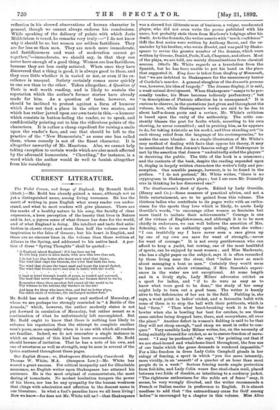CURRENT LITERATURE.
The Violet Crown, and Songs of England. By Rennell Road. (Stott.)—Mr. Redd has already gained a name, although not as yet a distinguished name, among living versemen. He has the merit of writing in pure English what every reader can under- stand, and what to most readers will give pleasure. There are the marks of a healthy nature in his song, the faculty of clear expression, a keen perception of the beauty that lives in Nature and in Art, a joyous sense of what Greece has done for the world, and of what England is doing. His intellect and taste find satis- faction in classic story, and more than half the volume owes its inspiration to the Isles of Greece; but his heart is English, and there are no sincerer lines in the volume than those written at Athens in the Spring, and addressed to his native land. A por- tion of these "Spring Thoughts" shall be quoted et England, island England ! if it has been my lot To live long years in alien lands, with men who love thee not,
I do but love thee better who know each wind that blows, The wind that slays the blossom, the wind that buds the rose, The wind that shapes the taper mast and keeps the topsail furled, The wind that braces nerve and arm to battle with the world.
0 land so loved through length of years, so tended and caressed, The land that never stranger wronged, nor foeman dared to wa-te, Remember those thou speedest full round all the world to be Thy witness to the natwau3,thy warders on the seal And keep for those who leave thee, and find no better place, The olden smile of welcome, the unchanged mother-face."
Mr. Rodd has much of the vigour and method of Macaulay, of whom we are perhaps too strongly reminded in "A Battle of the Armada," which, however, the author modestly states is not put forward in emulation of Macaulay, but rather meant as a continuation of what he unfortunately left uncompleted. But Mr. Rodd ought to know that there is nothing less likely to enhance his reputation than the attempt to complete another man's poem, more especially when it is one with which all readers are familiar. Indeed, we do not remember a single instance in which an attempt of this kind has been successful. Mr. Rodd should beware of imitation. That he has a note of his own, and one of sweetness as well as strength, may be seen in several of the lyrics scattered throughout these pages.


































 Previous page
Previous page